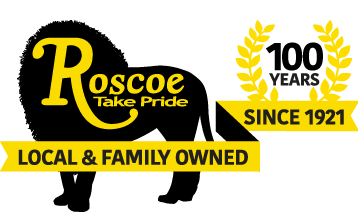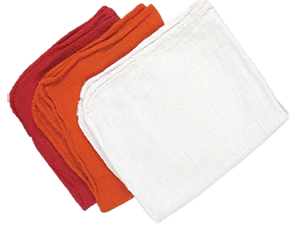Now that the Shop Towel Rule has recently been enacted, we get asked a lot of questions on what it means for our customers. This blog post details answers to frequently asked questions (FAQ).
What is the “Shop Towel Rule”?
The Solvent Contaminated Wipe Rule, or “Shop Towel Rule” was published on July 31, 2013, by the U.S. EPA to exempt “reusable wipes” (known at Roscoe as “Print Towels” and “Shop Towels“) from regulation as solid waste so long as certain conditions are met. The rule entered into force on January 31, 2014 and revises the definition of “solid waste” under the EPA’s Resource Conservation and Recovery Act (RCRA) to conditionally exclude from further regulation (as a solid or hazardous waste) solvent-contaminated towels that are cleaned and re-used. Most of the requirements have been part of Roscoe’s standard operating procedures for decades.
What conditions must be met for reusable towels to be excluded from being categorized as a solid waste?
The following conditions must be met for solvent-contaminated Print Towels and Shop Towels that are sent to Roscoe for cleaning and reuse to be excluded from further RCRA regulation:
- Storage: towels must be accumulated, stored, and transported in non-leaking, closed containers that can contain free liquids, should they occur. This applies at both the customer and laundry facilities, as well as during transport.
- Roscoe rents a self-closing EPA compliant soil container or the customer may provide their own container(s).
- Roscoe rents EPA compliant sealed drums for customer onsite collection/storage and transportation to Roscoe for processing.
- Roscoe rents reusable bags for collection at the customer site and transports bags in sealed drums to Roscoe for processing.
- Roscoe stores soiled wipers in sealed containers until processed.
- Labeling: containers must be labeled “Excluded So/vent-Contaminated Towels.”
- Accumulation Time: customers may accumulate towels up to 180 days from the start date of accumulation prior to being sent for cleaning or disposal. Roscoe requires Print Towel accounts to be serviced weekly and Shop Towel accounts to be serviced no greater than every other week and recommends that customers collect all soiled towels on the same frequency to meet this standard and maintain a safe working environment. Customers should consult with a safety consultant or insurance loss control resource to determine a best practice that suits your specific circumstances.
- No Free Liquids: towels must contain no free flowing liquids at the point of transportation and there may not be free liquid in the container holding the towels. “No free liquids” is determined by customer application of EPA’s Paint Filter Test (EPA Test Method 90958) or an alternative authorized state standard.
- Management of Free Liquids: free liquids removed from towels or from the towel container must be managed according to applicable RCRA hazardous waste regulations. This applies to customer and laundry facilities. (Refer to FAQ 6for action required if Free Flowing liquids are discovered.)
- Record Keeping: customers must maintain documentation that includes (i) name and address of the laundry or dry cleaner to which towels are sent; (ii) documentation that the 180-day accumulation time limit is being met; (iii) description of the process the customer is using to meet the “no free flowing liquids” condition.
Please consult the EPA regulations (40 C.F.R. $261.4(a)(26)) for full details.
What type of container is acceptable for storage of Shop & Print towels?
Containers must be closed and capable of containing free flowing liquids should they occur. The container material and design is not prescribed by the regulation. The container, however, must be impermeable to liquid, no matter the material it is made from. The container should not show evidence of corrosion or other wear that could lead to escape or free liquids.
- Roscoe rents an EPA compliant sealed drum with a lid for customer onsite storage and transportation to Roscoe of Print Towels & Shop Towels.
- Roscoe rents a 30-gallon Soil Container – EPA Compliant with a self-closing lid for use at the customer’s site when several collection points are required.
- For smaller volume customers not requiring a drum, Roscoe provides a reusable bag for Print Towel and Shop Towel delivery of the clean and collection of the soiled from the customer’s site to Roscoe’s truck. Reusable bags are stored on the truck in an EPA compliant sealed drum with a lid.
How do I comply with the labeling requirements?
Roscoe labels the sealed soil containers we rent with “Excluded Soil Contaminated Towels” and customers should do the same for containers they provide.
Who is responsible to ensure no free flowing liquids are present?
The customer is responsible to ensure no free flowing liquids are present through periodic “Paint Filter Testing” or other approved methods and periodic inspection of sealed soil containers.
What happens if a Roscoe team member discovers Shop & Print towels containing free flowing liquids?
- At the customer’s location? Advise the customer that you are prohibited from transporting soiled towels with free flowing liquids and the customer must take steps to remedy the situation before the towels can be transported.
- In Roscoe’s truck? The route service rep (RSR) must immediately contact the customer service rep (CSR) and determine if it is advisable to immediately return the soil container to the customer or bring the soil container to Roscoe’s processing facility. The primary issue to consider is the distance to both alternatives and the safe handling of the soiled product.
- Prior to processing at Roscoe’s processing facility? The rule recognizes that despite the best efforts and compliance with the “no free flowing liquids” condition at the time of transport that free flowing liquids can result during transport. Roscoe is required to handle the free liquids in accordance with all hazardous waste regulations and will charge the customer for handling and disposal. The towels themselves remain under the exclusion and may be processed.
How should customers document compliance?
- Maintain records of your Service Agreement with Roscoe describing the frequency of scheduled deliveries and pick-ups.
- Maintain records of customer performed required “Paint Filter Test” or equivalent approved test.
- Customer signed invoices acknowledging the statement “Soiled Print/Shop Towel Container(s) Do Not Contain Free Flowing Liquids,” must be maintained by the customer.
- Customers should document their standard operating procedures on the collection of soiled towels, steps to prevent free flowing liquids and a contingency plan if free flowing liquids are found to be present in a soiled container.
- Please consult the EPA regulations (40 C.F.R. $261.4(a)(26)) for full details.
Are customers better off using disposable (paper or cloth) wipes?
No, for several reasons:
- Disposable wipes, unlike reusable Print Towels and Shop Towels, are considered solid waste.
- Disposable wipes are considered hazardous waste if they contain certain listed materials, like trichloroethylene (TCE), and not eligible for exclusion.
- Disposable wipes must go to combustors that are regulated under the Clean Air Act or RCRA, hazardous waste landfills or municipal solid waste landfills.
- Disposable wipes do not perform as well as reusable Print Towels and Shop Towels.
- Disposable wipes create a solid waste headache for the customer and fill our landfills with unnecessary waste that could prove to create a toxic problem in the future.
What is this program?
For smaller volume customers not requiring a drum, Roscoe provides a reusable bag for Print Towel and Shop Towel delivery of the clean and collection of the soiled from the customer’s site to Roscoe’s truck. Reusable bags are stored on the truck in an EPA compliant sealed drum with a lid.
Why is Roscoe making deliveries in reusable bags?
One of Roscoe’s early core values was the reuse of textile products that had previously been discarded. Reusable bags have been the standard in the linen industry and delivery of those products were converted to reusable bags with great success several months ago at Roscoe. It was a natural progression to expand the program to Print Towels and Shop Towels – although they require transportation in a sealed container on the truck.
Why are these reusable bags more expensive than the reusable bags Roscoe rents for linen products?
Two reasons:
- The wear and tear the Print Towel and Shop Towel bags are exposed to under the heavier soil conditions will cause these bags to wear out faster and require additional processing costs to clean.
- The additional handling required to comply with the “Shop Towel Rule” presents additional costs.
Are these bags EPA compliant with the “Shop Towel Rule”?
No they are not. That is why we rent a self-closing EPA compliant soil container or the customer may provide their own container(s) that work in concert with the reusable bags.
What if I need additional reusable bags?
Just ask your RSR to add additional bags to your delivery each week.
Is there an alternative to reusable bags?
You can opt for a drum with lid – EPA Compliant solution.

